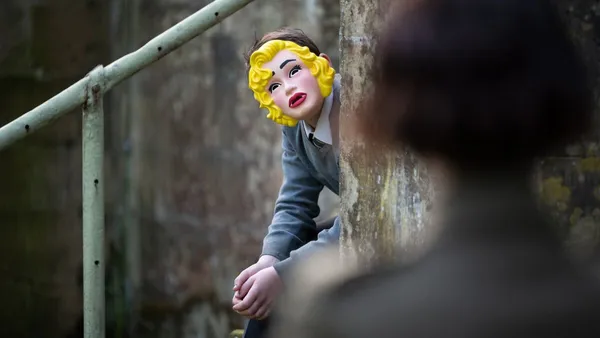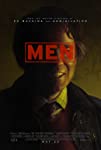Eye For Film >> Movies >> Men (2022) Film Review
Men
Reviewed by: Dora Leu

The English countryside is a place of horror(s) in Alex Garland’s latest Men, a study of creepy masculinities that is bound to divide its audience on meaning. While an impressive exercise of modern horror craftsmanship that could easily flirt with a cult film status, Men’s overcrowded and facile symbolism is as transparent as it is confusing, leaving much to be desired from an otherwise very good storyteller.
It’s not hard to guess that in the quaint village where recently-widowed Harper (Jesse Buckley) retreats to in the aftermath of her partner’s suicide there lies some dormant evil. If horror has taught us anything at all, gratuitous politeness is cause for suspicion. Something is clearly amiss with Harper’s eager holiday homeowner Gregory (Rory Kinnear) and his over-helpfulness. Soon an uncanny realisation settles in: all the men in the village (and in the village there are only men) seem to look exactly like Gregory, from barkeeper to vicar to teenage boy. That underlying evil comes to surface through all their snide remarks, their gaslighting, their casual implications that Harper is responsible for her husband’s death and that ultimately women ‘deserve’ whatever happens to them, tensions which ultimately expand into a full-on, slasher-like chase between tormentor and tormentee, axes and car run-overs included.

Garland’s transition from reality to a nightmarish world is satisfyingly slow yet very predictable, announced along the way by signs so overt that they lose any pleasurable mystery. Of course a rounded bridge over a creek is some sort of liminal space, of course an eerie image of Harper plucking an apple from a tree early into the film incites a biblical parable. The countryside has all the signs of foreshadowing superstition - masks, tricksters, some references to the Wicker Man or to the Green Man. At times, Men doesn’t seem to trust its viewer with subtlety or subtext, insisting on drawing attention where it’s not needed, such as, for example, when Gregory later jokes redundantly about how the apple that Harper takes from the tree is ‘forbidden fruit’.
The identification of Gregory’s many guises with archetypal misogynists also feels very at hand and evident, if not one-dimensional or even caricaturesque, as was proven when Harper’s unnamed harasser’s repeated standing naked in the garden elicited more awkward laughter than anxiety from the audience in my theatre. Kinnear’s striking performance does much to bring these characters to a new level, infusing them with a delightfully villainous charisma that alternates between the insidious obliviousness of the ‘nice guy’ type and active malicious intent. The disgust they evoke is almost palpable, thanks to Kinnear’s ability to embody such visible poisonousness behind a calm appearance.
Yet the greater problem with Garland’s mix of folktale and commentary on gender roles is that it ultimately feels much like a brand film, tailored to fit the expectations of a certain audience. Despite the reverence I am happy to offer Garland as a genre filmmaker and writer, having given us landmarks such as 28 Days Later and Ex Machina, it is hard to detach or even distinguish Men from the recent sum of A24’s new sleek horror productions.
On the one hand, there is some credit in saying that, in the sense that they all benefit from a gripping, potent, clean and cultivated visual style of slow, visceral disquietude that is very effective in creating an aftertaste of profound unsettlement. Men’s initial meditative tone, followed by the clash of lavish, welcoming vegetation and warm, suffocating interiors are essential to the construction of its nightmare, cleverly matched with old timely choral, echo-like vocals that are part of a fairytale as much as they are the harbingers of dread. On the other hand, Garland’s blend of folklore and terror is unlucky enough to feel like a collection of themes and images already trodden upon by other A24 films.
As such, horror as a metaphor for grief is equally present in Ari Aster’s two features, the suspect over-hospitality is reminiscent of Midsommar, ominous naked characters waiting in gardens are enough to remind of some visuals from Valdimar Jóhannsson’s Lamb. Most strikingly, the transformation of one of Gregory’s guises into a woody Green Man brings to mind the equally vegetal title character from David Lowery’s The Green Knight. Men suffers much from this familiarity and is robbed of so much potential sense of novelty that it begs the question whether the film would have been much different should anyone else other than Garland have directed it under A24. It might have simply at least looked the same - the images are majestic, the sound design is on par, yet, at this point, it almost feels as if a certain A24 recipe has been patented.
While in terms of craft it is quite pleasurable, Men still delivers a muddy message. The violent hide-and-seek between Harper and her tormentor seeks to act as a visual exorcism of all the tensions surrounding the topic of toxic masculinity, yet it remains unclear what should be taken away from it. Should it be seen as a story about a woman, who is trying to process the complicated grief caused by the death of an abusive and exploitative husband? Or is it rather an archetypal battle of the sexes that seeks to deliver some assessment on a larger issue?
Garland’s constant nudge into the metaphorical, the parabolical and the universal through heavy use of symbols seems to incite towards the second reading, particularly through a very baffling scene where these abusive men seem to be cyclically birthing each other - another moment which may have missed its intended meaning, as my fellow audience members found it outright ridiculous. A film about Harper as an individual experience that only just touches on a larger context might have been a more fortunate option, for a potent discussion about gender roles often needs much clarity and nuance. The fact that by the end of the film Garland never negotiates back the border between fantasy, dream and reality seems in theory like a promising narrative point to end on, but it also adds to the confusion as to what from the film can be applied to real society.
At times shivers-down-the-spine arresting, at other times accidentally awkward, Alex Garland’s Men is a dizzying experience that borders the subgenre of revenge horror, yet becomes its own worst enemy when it aims to speak too broadly. Although savorously disgusting in its alternation between gore and picturesque visuals of the English countryside, there is one point that Men fails to notice: misogyny is scariest when you don’t see it coming (at you with the axe).
Reviewed on: 31 Jul 2022



















